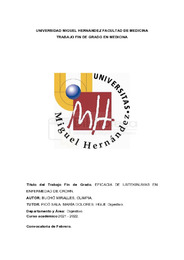Please use this identifier to cite or link to this item:
https://hdl.handle.net/11000/28479Eficacia de ustekinumab en enfermedad de Crohn
| Title: Eficacia de ustekinumab en enfermedad de Crohn |
| Authors: Buchó Miralles, Olimpia |
| Tutor: Picó Sala, María Dolores |
| Editor: Universidad Miguel Hernández |
| Department: Departamentos de la UMH::Medicina Clínica |
| Issue Date: 2022-02-09 |
| URI: https://hdl.handle.net/11000/28479 |
| Abstract: INTRODUCCIÓN Ustekinumab (UST) es un anticuerpo (AC) monoclonal humano inhibidor de la subunidad p40 de la interleucina 12 (IL-12) e IL-23 que ha demostrado eficacia en el mantenimiento y remisión de la enfermedad de Crohn (EC). El objetivo primario del estudio es analizar su eficacia en la práctica clínica. MÉTODOS Se ha realizado un estudio observacional, descriptivo para la valoración de UST en la práctica clínica. En él, se han incluido 29 pacientes con EC en los que se ha recogido una serie de variables clínicas a través de su historial e informes de consultas de los pacientes. Cabe destacar que todos ellos habían recibido un anti- factor de necrosis tumoral (anti-TNF) previo que ha sido insuficiente para controlar la enfermedad. RESULTADOS La proporción de pacientes en tratamiento con UST que ha normalizado su valor de proteína C reactiva (PCR) ha sido de hasta un 64% (18/28) de los pacientes y un 56% (15/27) han disminuido su calprotectina fecal (CPF) por debajo de 250, con una mediana de 34 meses de tratamiento. La tasa de abandono por falta de respuesta o pérdida de seguimiento ha sido de un 3,4% (1/29). Respecto a la valoración del impacto del tabaco, no se observa que haya un mayor número de pacientes que desarrolle enfermedad perianal ni de fístulas en el grupo de fumadores. En cuanto al subanálisis de los marcadores inflamatorios, se puede apreciar que los pacientes que han recibido cotratamiento con inmunomoduladores (IMM) han normalizado la PCR en una proporción del 92% (11/12) con respecto a los que no reciben este tratamiento, siendo del 50% (5/10). Por otra parte, entre los efectos adversos (EA) se ha observado que el 24% (7/29) de los pacientes han presentado algún trastorno gastrointestinal desde el inicio de tratamiento. CONCLUSIONES Entre los pacientes con EC que han presentado fracaso previo a la terapia anti- TNF, se observó respuesta a UST en la mitad de los casos. La adición de IMM a esta terapia parece tener un efecto beneficioso en el mantenimiento de dicha respuesta. Por otra parte, no se aprecia relación entre el tabaco y pérdida de eficacia ni curso de enfermedad más grave. INTRODUCTION Ustekinumab is a human monoclonal antibody against the subunit p40 of interleukin-12 and interleukin-23 that has shown efficacy in the maintenance and remission of Crohn's disease. The primary end point is to analyze its efficacy in clinical practice METHODS An observational, descriptive study has been carried out for the evaluation of ustekinumab in clinical practice. There was 29 patients with Crohn’s disease included, in which a series of clinical variables have been collected through their history and medical consultations. It is important to mention that all of them had received a previous anti-TNF that has not been enough to control the disease. RESULTS The proportion of patients under treatment with ustekinumab who have normalized their CRP value has been up to 64% (18/28) of the patients and 56% (15/27) have decreased their FCP below 250, with a median of 34 months of treatment. The dropout rate due to lack of response or loss of follow-up has been 3.4% (1/29). Regarding the review of the impact of tobacco, it is not observed that the development of perianal disease or fistulas is higher in the group of smokers. Regarding the subanalysis of inflammatory markers, it can be observed that patients who have received co-treatment with IMM have normalized CRP in a proportion of 92% (11/12) in comparison with those who have not received 50% (5/10). On the other hand, among the adverse effects observed, it has been reported that 24% (7/29) of the patients have presented some gastrointestinal disorder since the start of treatment. CONCLUSIONS Among Crohn’s disease patients with who were resistant to anti-TNF, response to UST is observed in half of cases. Addition of inmunomodulators to this therapy appears to have a beneficial effect in maintaining this response. On the other hand, there is no relationship between smoking and loss of efficacy neither more serious course of disease. |
| Keywords/Subjects: Ustekinumab Enfermedad de Crohn Anti-factor necrosis tumoral Tabaco |
| Knowledge area: CDU: Ciencias aplicadas: Medicina |
| Type of document: info:eu-repo/semantics/bachelorThesis |
| Access rights: info:eu-repo/semantics/openAccess Attribution-NonCommercial-NoDerivatives 4.0 Internacional |
| Appears in Collections: TFG- Medicina |
.png)

